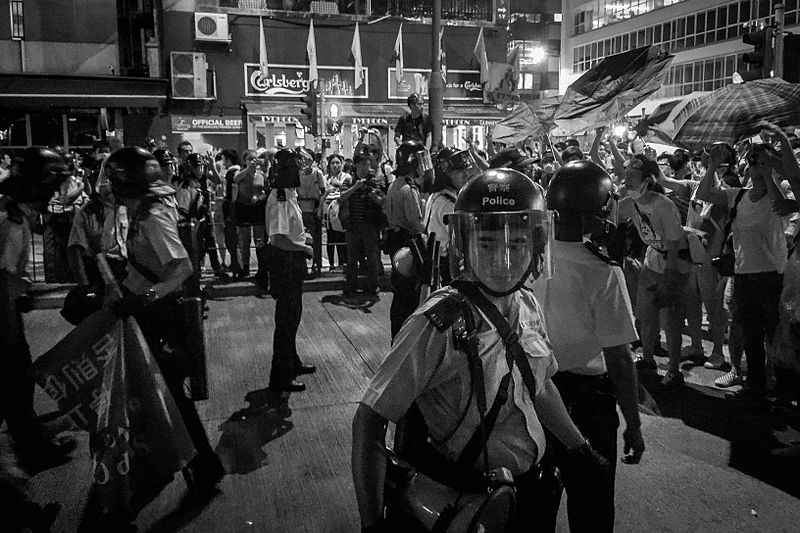
Written by: Emily Wilson
Posted on October 16th, 2019
In a recent talk at Allard Law’s Centre for Asian Legal Studies, Randy Shek, a practicing barrister from Hong Kong, painted a grim picture of the deteriorating trust between the Hong Kong police and members of the public. The title of the talk perhaps says it all: “The Force is No Longer with You.”
Until recently, Hong Kong’s police force was widely lauded as “Asia’s finest”, and well-respected by the public. This was not always the case: the Hong Kong police had been tested by civil unrest before. In the 1960s, a sense of nationalistic pride drove young leftists and communists to violent protests, who viewed police officers as enforcers of colonial oppression. In turn, policing was high-handed, arresting thousands of protestors, with several individuals even dying. Moreover, widespread corruption within the police force, including collusion with triads involved with gambling, drugs, and prostitution, led to unfavorable views by the public.
1974 was a turning point: an independent commission against corruption was established; the commission was made directly answerable to the governor. Similarly, an extensive exercise in public relations was also put in place, including the formation of a nonprofit organization for youth interested in joining the force, as well as television programs and police dramas painting officers in a positive light (this genre became so popular that even Hollywood took note, giving rise to such films as Infernal Affairs).
Flash forward to the past few years, and this trust between Hong Kong police and civilians has begun to deteriorate, taking a nosedive in the last number of months. Since his return to Hong Kong in 2006, Shek says, he has witnessed firsthand the stark change in police officers’ attitudes towards protestors. Previously, policing had been restrained and the use of force rare. Prosecutions were similarly relatively uncommon, generally reserved for assaulting police officers, obstructing justice, or organizing a mass scale protest. However, in the run up to the 2014 Occupy Movement, in providing legal support to protestors, Mr. Shek observed increased hostility and use of force.
In 2014, the Occupy Movement was dealt with through nonviolent means. The Hong Kong government did not use police to clear protestors, but relied on civil injunctions and other legal tools. 2016 marked the first occasion that Mr. Shek witnessed police officers opening fire (although not at protestors, but at the sky in an effort to disperse rioters). According to Shek, the use of force further increased in 2019, and police tactics changed: they used pepper spray, fired teargas in confined spaces, and shot rubber bullets and beanbag rounds, in one case blinding a woman who had been providing first aid. One of the most controversial events occurred in the Prince Edward Subway Station in Hong Kong in August of 2019, which saw police arbitrarily attacking protestors and civilians.
Shek reports that accompanying this increased hostility and excessive use of force has been diminishing accountability, exacerbated by signs of approval by upper ranks of police, and even government. Up until 2016, police officers on active duty all wore identification numbers on their shoulders. In 2019, these disappeared, with some police officials going so far as to report to duty in plain clothes. The police justified the lack of numeric identification by claiming officers’ faces were identification enough; however, this was followed shortly by helmets and visors with reflective foil, allegedly for the purpose of protection against protestors’ use of laser pointers.
According to Shek, equally concerning were the off-duty officers being equipped with extendable batons, and the accusations and subsequent admission of police officers disguising themselves as protestors. In video footage, police can be observed planting evidence on protestors.
Mr. Shek notes that despite the seeming unbridled power and force of the police officers, they have been held accountable on occasion, as demonstrated by the prosecution of seven police officers for kicking a protestor into a dark corner and beating her. This check on police authority is compromised by the fact that until their convictions, the officers were simply suspended and received full pay. More generally, Shek argues that individual convictions accomplish little in addressing the widespread and systemic abuse of force. When these officers were convicted, there was a massive police outcry, with police claiming they were persecuted.
Mr. Shek suggests that Hong Kong is turning into a police state, in which the police shows a sense of impunity for their actions. Fortunately, he argues, the Hong Kong public is unprecedentedly united in their demands. While the extradition bill has been withdrawn, the public is not satisfied: they want police held to account, in the form of an independent commission of inquiry that can initiate investigations without waiting for a complaint, subpoena witnesses, and protect the privileged identity and statements of witnesses.


 Follow
Follow